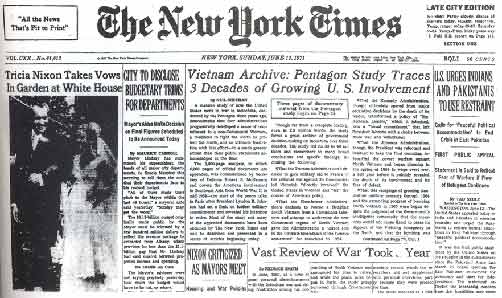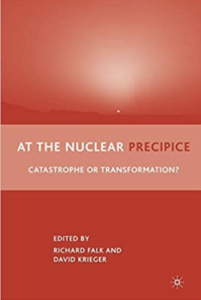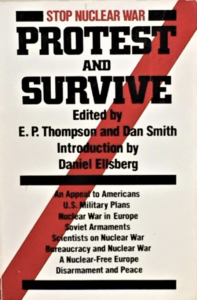 Forty years ago today—June 13, 1971—the New York Times began publishing the top secret study which came to be known as the Pentagon Papers.
Forty years ago today—June 13, 1971—the New York Times began publishing the top secret study which came to be known as the Pentagon Papers.
Daniel Ellsberg talked with NPR on the anniversary:
 Forty years ago today—June 13, 1971—the New York Times began publishing the top secret study which came to be known as the Pentagon Papers.
Forty years ago today—June 13, 1971—the New York Times began publishing the top secret study which came to be known as the Pentagon Papers.
Daniel Ellsberg talked with NPR on the anniversary:
June 13th, 2011, marks the 40th anniversary of the initial publication of the Pentagon Papers in the New York Times.
Daniel Ellsberg was interviewed for pieces in both the New York Times and CNN on the anniversary, and on the government’s decision to declassify the Papers.
In the New York Times piece, Daniel said:
It’s absurd. . . . The reasons [for keeping it secret all these years] are very clearly domestic political reasons, not national security at all. The reasons for the prolonged secrecy are to conceal the fact that so much of the policy making doesn’t bear public examination. It’s embarrassing, or even incriminating. . . .
It seems to me that what the Pentagon Papers really demonstrated 40 years ago was the price of [Congress giving its war powers to the President. . . . ] [L]etting a small group of men in secret in the executive branch make these decisions — initiate them secretly, carry them out secretly and manipulate Congress, and lie to Congress and the public as to why they’re doing it and what they’re doing — is a recipe for, a guarantee of Vietnams and Iraqs and Libyas, and in general foolish, reckless, dangerous policies.
In the CNN piece, which contains a longer interview with Daniel, he said:
Here’s an article on the New York Times site interviewing Daniel about how he would have leaked the Pentagon Papers in the age of the Internet
[Interviews and videos of Daniel Ellsberg on Vietnam/Afghanistan parallels posted on The Real News Network]
The Most Dangerous Man in America: Daniel Ellsberg and the Pentagon Papers premieres in the US today. Here are press reviews:
[Daniel’s chapter The Challenge of Abolishing Nuclear Weapons, ed. David Krieger. It was originally presented at The Challenge of Abolishing Nuclear Weapons, a conference organized by the Toda Institute for Global Peace and Policy Research, in partnership with the Nuclear Age Peace Foundation, September, 2007 in San Francisco.]
The chance that some nuclear weapon will kill masses of innocent humans somewhere, before very long, may well be higher than it was before the fall of the Berlin Wall. One phase of the Nuclear Age, the period of superpower arms race and confrontation, has indeed come to a close, for now. But another dangerous phase now looms, the era of nuclear proliferation and with it an increased likelihood of regional nuclear wars and nuclear terrorism. This prospect is enhanced not just by “rogue” states or sub-state terrorists but above all by the United States.
[Daniel’s chapter in At the Nuclear Precipice: Catastrophe or Transformation?, edited by Richard Falk and David Krieger. Originally presented at the 2006 symposium, At the Nuclear Precipice: Nuclear Weapons and the Abandonment of International Law organized by the Nuclear Age Peace Foundation.]
 Long after the ending of the Cold War, the chance that some nuclear weapons will kill masses of innocent humans somewhere, before very long, may well be higher than it was before the fall of the Berlin Wall.
Long after the ending of the Cold War, the chance that some nuclear weapons will kill masses of innocent humans somewhere, before very long, may well be higher than it was before the fall of the Berlin Wall.
One phase of the Nuclear Age, the period of superpower arms race and confrontation, has indeed come to a close (though the possibility of all-out, omnicidal exchange of alert forces triggered by a false alarm remains, inexcusably, well above zero). But another dangerous phase now looms, the era of nuclear proliferation and with it, an increased likelihood of regional nuclear wars, accidents, and nuclear terrorism.
[Daniel’s op-ed in the Los Angeles Times, 4/21/04]
Mordechai Vanunu is the preeminent hero of the nuclear era. He consciously risked all he had in life to warn his own country and the world of the true extent of the nuclear danger facing us. And he paid the full price, a burden in many ways worse than death, for his heroic act — for doing exactly what he should have done and what others should be doing.
[Daniel’s introduction to Protest and Survive, 1981]
 “It has never been true that nuclear war is ‘unthinkable.’ It has been thought and the thought has been put into effect.” E.P. Thompson refers here, in the brilliant and moving essay that opens this volume, to the deliberate destruction of the people of Hiroshima and Nagasaki in August 1945. What he does not mention is that the Americans who conceived and ordered this project, like those who prepared it and carried it out and the great majority of the public who learned of it after the event, regarded the effects of the first nuclear war as marvelously successful. Such thoughts get thought again, and acted on.
“It has never been true that nuclear war is ‘unthinkable.’ It has been thought and the thought has been put into effect.” E.P. Thompson refers here, in the brilliant and moving essay that opens this volume, to the deliberate destruction of the people of Hiroshima and Nagasaki in August 1945. What he does not mention is that the Americans who conceived and ordered this project, like those who prepared it and carried it out and the great majority of the public who learned of it after the event, regarded the effects of the first nuclear war as marvelously successful. Such thoughts get thought again, and acted on.